| Article ID | Journal | Published Year | Pages | File Type |
|---|---|---|---|---|
| 7352838 | Games and Economic Behavior | 2018 | 17 Pages |
Abstract
There is ample evidence that the number of players can have an important impact on the cooperation and coordination behavior of people facing social dilemmas. With extremely few exceptions, the literature on cooperation assumes common knowledge about who is a player and how many players are involved in a certain situation. In this paper, we argue that this assumption is overly restrictive, and not even very common in real-world cooperation problems. We show theoretically and experimentally that uncertainty about the number of players in a Volunteer's Dilemma increases cooperation compared to a situation with a certain number of players. We identify additional behavioral mechanisms amplifying and impairing the effect.
Related Topics
Social Sciences and Humanities
Economics, Econometrics and Finance
Economics and Econometrics
Authors
Adrian Hillenbrand, Fabian Winter,
